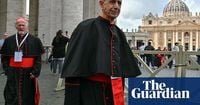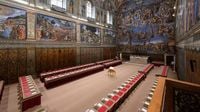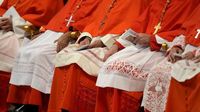As the world watches closely, the papal conclave to elect the next leader of the Roman Catholic Church is set to begin on May 7, 2025, in Vatican City. Following the death of Pope Francis, 133 cardinals from around the globe are gathering to select the 267th pope, marking what is expected to be the largest and most diverse conclave in history.
On the evening of May 6, Cardinal Blase Cupich led the North American Cardinals as they boarded buses to their sequestered quarters at the Vatican. Seminarians lined the road, applauding the men who will soon make one of the most significant decisions for the Catholic Church. The Sistine Chapel awaits, its beauty enhanced by Michelangelo's frescoes, as the cardinals prepare to cast their votes.
"There's lots of speculation, but nobody really is a front-runner," said Senior Religious Analyst Father Thomas Reese, who is witnessing his fourth conclave. He noted that the outcome is unpredictable, with the cardinals likely to choose someone in the middle ground—neither too progressive nor too conservative. "They're not going to elect somebody who gets up and says, 'Pope Francis was a disaster. We're going back to the old church.' Nor are we going to get somebody elected who says, tomorrow, 'I'm going to ordain women.'"
Cardinal Cupich has asked for prayers on social media, emphasizing the importance of this conclave. Observers believe he will play a significant role in discussions, as he is respected and trusted among his peers. Chase Hoffman, a student from St. Charles, Illinois, expressed the gravity of the moment, stating, "You walk through that door and it's like, wow, you really feel like the Holy Spirit kind of, like, flow through you. So, it's been amazing."
With 170 cardinals having arrived in Vatican City, the 12th and final general congregation was held on May 6, where discussions ranged from migration to the ongoing wars affecting various regions. Cardinal Jean-Paul Vesco from Algiers remarked that it would be "unexpected" if the conclave extends beyond Friday, May 9, indicating that the cardinals are eager to reach a decision.
The conclave will begin with a mass at St. Peter's Basilica, followed by the cardinals entering the Sistine Chapel, where they will be cut off from the outside world. They will take an oath of secrecy, and their cell phones will be confiscated until a new pope is elected. Voting will occur twice daily until a candidate receives a two-thirds majority, or 89 votes. The ballots will be burned after each session, with black smoke indicating no decision and white smoke signifying the election of a new pope.
As the cardinals prepare to cast their votes, they are also acutely aware of the challenges facing the Catholic Church. Issues such as sexual abuse scandals and financial struggles have tarnished the Church's reputation, and the cardinals must consider how to address these concerns while also fostering growth in regions like Africa and Asia, where Catholicism is on the rise.
Geographical and ideological factors will play a critical role in the decision-making process. The cardinals, of whom 108 were appointed by Pope Francis, represent various factions within the Church, leading to tensions between progressive and traditionalist viewpoints. The European cardinals, numbering 53, remain the largest voting bloc, but the influence of cardinals from the Global South is increasingly recognized.
Speculation about potential successors to Pope Francis includes names like Cardinal Luis Tagle from the Philippines, often referred to as "the Asian Francis," and Cardinal Pietro Parolin, the Vatican's Secretary of State. Others mentioned are Cardinal Robert Prevost from the U.S., known for his solid judgment, and Cardinal Reinhard Marx from Germany. However, traditionalists such as Cardinal Péter Erdő from Hungary and Robert Sarah from Guinea are also lobbying for a conservative successor.
Despite the speculation, the conclave remains unpredictable. As history shows, candidates not initially seen as frontrunners can emerge victorious. In 2013, Jorge Mario Bergoglio, now Pope Francis, was not considered a contender until he was elected. This conclave, described as "totally unpredictable" by UK theologian Professor Anna Rowlands, reflects a significant shift in the composition of the College of Cardinals.
The cardinals are aware that they must choose a leader who can unify the Church in a time of crisis. As one Vatican official noted, they seek someone capable of "being a bridge and a guide for a disorientated humanity marked by the crisis of the world order." The conclave must be kept short, ideally lasting no more than three to four days, as the urgency to elect a new pope weighs heavily on the electors.
As the cardinals prepare to enter the conclave, they do so with a sense of purpose and responsibility. They are not just electing a new pope; they are choosing a leader who will navigate the complexities of a rapidly changing world, address the Church's internal challenges, and inspire the faithful. The eyes of the world are on Vatican City, waiting for the moment when the smoke signals a new era for the Catholic Church.



